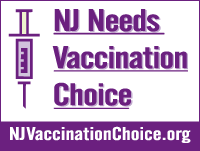Suburban Trends Full Story with comments: http://www.suburbantrends.com/NC/0/614.html
NORTH JERSEY - Vaccinations have long been accepted as the answer to preventing disease – but could they pose other dangers for some children?
This is the question more and more parents are beginning to ask, especially now that the state is set to add two more vaccines to the required list, bringing the total to 13 vaccines over a person’s lifetime.
And now, parents who have found that their answer is “Yes, vaccinations can be dangerous” are asking lawmakers to lift some requirements and urging parents to research before vaccinating.
“I wish I had asked questions,” said Mary DeLaosa, a former long-time Bloomingdale resident and mother of two boys, ages 11 and 10, who believes that vaccines led to one of her son’s autism-like symptoms.
One mother’s experienceDeLaosa is a member of New Jersey Coalition for Vaccination Choice (NJCVC), a group of parents, physicians, holistic organizations and autism support groups concerned with the growing number of mandated vaccinations.
DeLaosa said that she was late on vaccinating her older son but vaccinated her younger son at the doctor-recommended ages. After his vaccinations, her younger son’s behavior and development changed, she said.
“He was developing fine, but then be became a different kid. He lost everything,” she said.
DeLaosa’s younger son developed autism, she said. The link between vaccines and autism has been debated for a long time.
While the Center for Disease Control (CDC) acknowledges on its web site that a 1998 study of autistic children raised the question of a connection between the measles, mumps and rubella (MMR) vaccine and autism, the CDC says additional scientific studies have found no relationship between the vaccine and autism.
The incidence rate of autism in New Jersey children is about one in 94. In boys, it is about one in 60 and for girls it’s one in 250.
DeLaosa said after she stopped vaccinating and her son went through three to four years of therapy and an applied behavior analysis, he recovered from his autistic tendencies.
“We were able to pull him out of it,” DeLaosa said.
DeLaosa also noticed that her older son, after he received his five-year vaccinations, became much more ill. He had strep throat several times that year and developed pneumonia and asthma.
“He was never asthmatic before that,” DeLaosa said.
When her younger son’s behavior started changing, DeLaosa conducted research on the link between vaccines and autism and came to believe that she should have questioned doctor immunization recommendations, even as early as the Hepatitis B vaccination newborns are given while still in the hospital. The disease is transmitted through bodily fluids and all mothers are checked for it before delivery.
“They don’t tell you why. I didn’t even think to question. I just figured doctors know,” she said.
DeLaosa has opted to have some vaccinations administered to her children but believes that the schedule on which vaccinations are given is not optimal for all children, and caused her children harm.
“With whatever makeup my kids have, the shots just didn’t agree,” she said. “When they do vaccinate, it should agree with the child… There’s no need to rush everything.”
Vaccines in New JerseyNew Jersey’s Public Health Council, a voluntary advisory panel appointed by the governor, has voted to add the flu and meningococcal vaccines to the immunization schedule, to start in the fall. New Jersey would be the first state to require these vaccines.
When the two vaccines are added, New Jersey will require 13 vaccines for various diseases, to be given in 35 doses.
The NJCVC is urging lawmakers to support the Conscientious Exemption to Vaccination bill (A260/S1071) that would make it easier for parents to exercise a choice as to how they vaccinate their children. The bill would allow for conscientious exemptions, which 20 other states allow, the NJCVC said.
Parents may avoid required vaccinations via a religious exemption, but it’s getting harder for parents to utilize the religious exemption, according to the NJCVC.
DeLaosa takes the religious exemption to get her kids into school while she utilizes “tighter” tests, which analyze her children’s antibodies so that she can decide when vaccines are appropriate.
NJ’s required immunizationsThe following are diseases for which vaccines are required in New Jersey:
—Diphtheria - Disease spread by bacteria or germs. Can make it impossible toTo be added in the fall:
breathe and cause heart problems.
—Tetanus - Caused by a toxin produced by a
germ that enters through a wound. Causes serious, painful spasms of all muscles
and can lead to lockjaw. Three of 10 people die.
—Pertussis (whooping cough)
- Caused by bacteria. Causes spells of violent coughing and choking. Can last
for weeks.
—Polio - Caused by a virus spread by contact with feces of an
infected person. Sudden fever, sore throat, headache, muscle weakness and pain;
can cause paralysis and death.
—Measles - Virus is spread very easily.
Symptoms include a rash, fever, cough and watery eyes. Can also cause pneumonia,
brain damage, seizures or death. Of every 1,000 children who get measles, one or
two will die.
—Mumps - Causes fever, headaches and swollen salivary glands.
Children may develop a mild meningitis and sometimes encephalitis. Can also
result in permanent hearing loss.
—Rubella (German measles) - Usually causes
a mild sickness with fever, swollen glands and a rash that lasts about three
days. A pregnant woman can lose her unborn baby, or the baby can be born with
serious problems.
—Hib Disease - Haemophilus influenzae type B (Hib) bacteria
causes meningitis; can also cause pneumonia and infection of the blood, joints,
bone, throat and heart covering.
—Hepatitis B - An infection of the liver.
Spreads through contact with blood or other body fluids. Causes a flu-like
illness. Stays in the liver and can result in severe liver diseases or
cancer.
—Varicella (chickenpox) - Causes a rash, itching, tiredness and
fever. Can lead to pneumonia, brain infection or death.
—Influenza
—Meningococcal









No comments:
Post a Comment